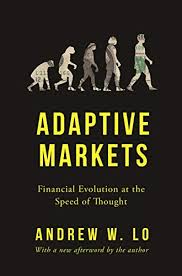Overview : Adaptive Markets By Andrew W. Lo
-
Book Title: Adaptive Markets
-
Author: Andrew W. Lo
-
Publication Date: May 2017
-
Rating: 4.5
-
price: $22.95
-
Pages: 504
Author Information
The author of Adaptive Markets: Financial Evolution at the Speed of Thought, Andrew W. Lo, is a renowned economist and professor at MIT Sloan School of Management. Known for his groundbreaking work in financial markets, he blends insights from psychology, neuroscience, and evolutionary biology to reshape how we understand market dynamics.
Introduction to Adaptive Markets: Financial Evolution at the Speed of Thought by Andrew W. Lo
In "Adaptive Markets: Financial Evolution at the Speed of Thought," Andrew W. Lo, a distinguished professor at the MIT Sloan School of Management, presents a groundbreaking perspective on financial markets that challenges traditional theories and offers a fresh framework for understanding market behavior.
Adaptive Markets Book Review Summary
Lo's masterpiece introduces the Adaptive Markets Hypothesis (AMH), a revolutionary concept that views financial markets through the lens of evolutionary biology and psychology. This innovative approach challenges the long-standing Efficient Market Hypothesis (EMH) and provides a more nuanced understanding of market dynamics.
"Markets are not always efficient, but they are highly competitive and adaptive, and they continuously evolve."
Analysis of Themes
Evolutionary Finance
Lo draws fascinating parallels between financial markets and biological ecosystems, arguing that both are shaped by evolutionary forces. This perspective offers valuable insights into market trends and investor behavior, particularly relevant in today's rapidly changing financial landscape.
Behavioral Economics
The book delves deep into the psychological aspects of investing, exploring how cognitive biases and emotions influence market participants. This approach provides a more realistic view of market behavior than traditional theories, offering valuable insights for personal finance and investment strategies.
Adaptability in Finance
Lo emphasizes the importance of adaptability in financial markets, a concept that resonates strongly in today's dynamic economic environment. This theme is particularly relevant for understanding recent market trends, including the rise of cryptocurrencies and the impact of technological innovations on banking.
Writing Style
Lo's writing is engaging and accessible, striking a balance between academic rigor and practical relevance. He skillfully weaves together complex ideas from various disciplines, making the book an enlightening read for both finance professionals and enthusiasts.
"The AMH suggests that market efficiency is not an all-or-nothing condition but a continuum, one that adapts over time as environmental conditions and investor populations change."
Strengths and Weaknesses of Adaptive Markets Book
Strengths:
- Innovative approach to financial theory
- Interdisciplinary insights
- Compelling case studies and real-world applications
- Balanced critique of existing theories
Weaknesses:
- Some readers may find the biological analogies challenging
- The AMH lacks the mathematical precision of the EMH
Related Books to Adaptive Markets By Andrew W. Lo
"Adaptive Markets" stands out among finance books for its unique evolutionary perspective. While it shares some themes with behavioral finance classics like Daniel Kahneman's "Thinking, Fast and Slow," Lo's work goes further by proposing a comprehensive alternative to traditional market theories.
Compared to more conventional finance books like Burton Malkiel's "A Random Walk Down Wall Street," Lo's work offers a more dynamic and nuanced view of market behavior, making it particularly relevant for understanding modern financial phenomena.
Implications for Investors and Financial Professionals
Lo's work has significant implications for investing and personal finance. The AMH suggests that traditional buy-and-hold strategies may need to be reconsidered in favor of more adaptive approaches. For financial professionals, the book underscores the importance of continual learning and adaptation in an ever-changing market environment.
The insights from "Adaptive Markets" are particularly relevant for understanding recent market trends, including:
- The volatility of cryptocurrency markets
- The impact of high-frequency trading
- The role of artificial intelligence in finance
- The changing landscape of banking and financial services
Highlights from Adaptive Markets
Adaptive Markets Hypothesis (AMH): Markets are not fully efficient; they evolve based on investor behavior, adapting to new information and environments.
Blending Economics and Evolution: Combines principles of traditional economics with evolutionary biology, suggesting finance adapts like a living ecosystem.
Investor Psychology: Human emotions, biases, and irrational behaviors drive market fluctuations, challenging efficient market theory.
Risk and Innovation: Risk management should adapt continually to innovation and changing economic landscapes.
Survival and Competition: Success in markets depends on adaptability and the ability to learn from changing conditions, similar to survival in nature.
Financial Crises Insight: Market crashes stem from behavioral factors, not just market inefficiencies.
Conclusion
"Adaptive Markets" is a must-read for anyone seeking a deeper understanding of financial markets. Lo's innovative approach provides valuable insights for investors, financial professionals, and policymakers alike. By challenging conventional wisdom and offering a more flexible framework for understanding market behavior, this book paves the way for more effective investment strategies and risk management practices.
As financial markets continue to evolve at an unprecedented pace, the ideas presented in "Adaptive Markets" will undoubtedly play a crucial role in shaping the future of finance. Whether you're a seasoned investor or just starting your financial journey, this book offers invaluable insights that can help you navigate the complex world of modern finance.





